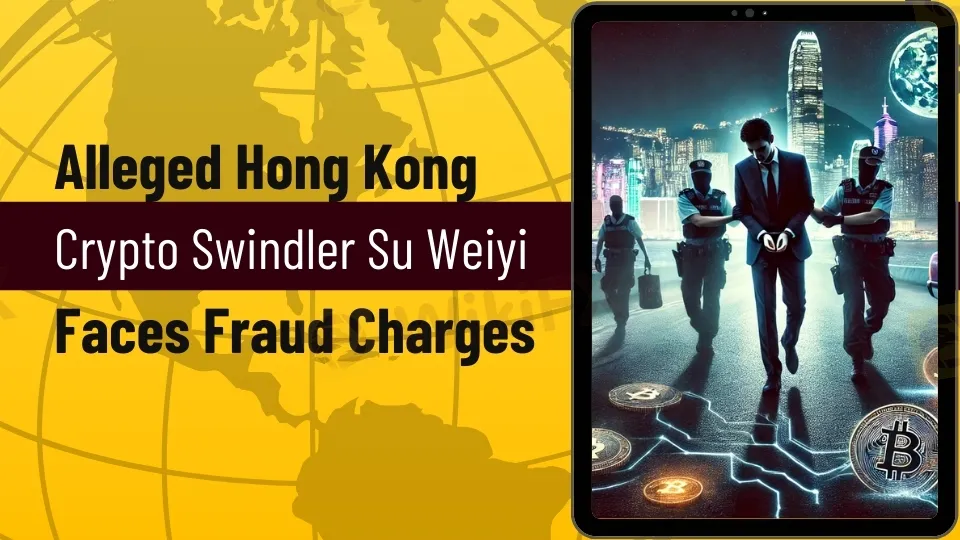Alleged Hong Kong Crypto Swindler Su Weiyi Faces Fraud Charges
Abstract:Su Weiyi, the alleged mastermind of Atom Asset Exchange, faces charges of theft in Hong Kong after the platform’s collapse. The case uncovers links to Southeast Asian crime syndicates.

Hong Kong authorities have charged Su Weiyi with theft after the collapse of Atom Asset Exchange (AAX) in 2022. The platform, once popular with over two million users, collapsed under fraud and mismanagement accusations. Now, Su Weiyi is the focus of an investigation spanning Hong Kong, Singapore, and the Philippines. The case raises serious concerns about links between cryptocurrency platforms and organized crime in Southeast Asia.
The Fall of Atom Asset Exchange (AAX)
In 2022, AAX suddenly shut down, leaving millions of dollars in user assets unaccounted for. Investors were shocked when their funds vanished, sparking a major scandal. Hong Kong police named Su Weiyi as the “mastermind” behind the platforms collapse. They accuse him of stealing millions in digital assets. He later returned to Hong Kong, where he now faces theft charges.
The case is closely followed by legal experts, regulators, and investors. Su Weiyi has not yet been convicted.
Ties to Money Laundering in Singapore and the Philippines
Su Weiyis involvement goes beyond AAX. Corporate records show he co-owned companies with people linked to a money laundering syndicate in Singapore. This group is under investigation for online scams and human trafficking. These links have raised concerns about how criminal networks are using cryptocurrency platforms across Southeast Asia.
Su Weiyi is also connected to Wang Dingkai, a businessman involved in cryptocurrency scams in the Philippines. In 2023, Philippine authorities raided a firm co-founded by Wang. The firm was involved in both investment scams and human trafficking. Su Weiyis ties to these activities highlight the growing use of digital assets to launder money.

Growing Concern Over Cryptocurrency Scams
As cryptocurrency markets grow in Southeast Asia, scams are increasing. The United Nations Office on Drugs and Crime (UNODC) has warned about the rise of organized crime tied to cryptocurrency exchanges. Digital platforms are becoming tools for money laundering and other illegal activities.
Benedikt Hoffmann, deputy representative for Southeast Asia at the UNODC, noted that business networks, both legal and illegal, are becoming more complex. The case involving Su Weiyi and Wang Dingkai shows how these networks operate across borders, mixing legal business with criminal operations.
Related News:
No Proof of Money Laundering via AAX, but Questions Remain
There‘s no direct evidence that AAX was used for money laundering. However, Su Weiyi’s ties to organized crime raise concerns. Experts wonder if some profits from scams and human trafficking flowed through AAX. Investigators are still looking into these connections. This case reveals how vulnerable cryptocurrency platforms are to illegal financial activities.
Regulators and Legal Experts Step In
As the investigation continues, regulators and financial crime experts are increasing their efforts to monitor cryptocurrency markets. Hong Kong and Singapore, two major financial hubs, are tightening controls to prevent fraud and money laundering in these digital ecosystems.
Legal professionals and law enforcement are working to uncover the full extent of the criminal networks linked to AAX and other cryptocurrency scams. This case could set a new standard for future investigations into digital currency schemes.
Conclusion
The case against Su Weiyi, accused of orchestrating one of Hong Kong‘s largest cryptocurrency frauds, has drawn global attention. His ties to money laundering in Singapore and scams in the Philippines highlight the dangers of Southeast Asia’s growing cryptocurrency industry. Investors, regulators, and legal professionals are watching closely as this case could shape the future of cryptocurrency markets and efforts to fight financial crime.
Get the latest on the Su Weiyi case and more financial news. Visit WikiFX News for full coverage.

Read more

$360 Million International Pig-Butchering Scam Busted in Hong Kong
Hong Kong’s law enforcement has successfully dismantled a large-scale pig-butchering scam operation, which had amassed HK$360 million through fraudulent online schemes within the span of a year.

XM Launches US Election Mega Competition with $100,000 in Prizes
Join XM's US Election Mega Competition from Oct 31 to Nov 14, 2024, for a chance to win a share of $100,000 in cash prizes by trading election market volatility.

Robinhood Rolls Out Bitcoin and Ether Futures, New Trading Tools
Robinhood expands into crypto futures, offering Bitcoin and Ether derivatives with advanced tools for active traders, targeting U.S. and EU markets amid regulatory challenges.

Extradition Decision for Terraform Labs Co-Founder Do Kwon Nears
The legal proceedings surrounding Do Kwon, co-founder of Terraform Labs, are approaching a pivotal moment. According to reports from Montenegrin local media, the process of determining Kwon's extradition destination is in its final stages, with a decision anticipated by Sunday, October 19, 2024.
WikiFX Broker
Latest News
Ex-Philippine Mayor Tied to $30M Crypto Scam Unveiled
Coinbase vs. SEC: The Push for Hidden Ethereum Files
FX Brokers Celebrated Mental Health Day
IFEXCAPITAL: Broker Review 2024
RM3.46 Million Lost in Fake Online Investment Scheme
Alleged Hong Kong Crypto Swindler Su Weiyi Faces Fraud Charges
Interactive Brokers Opens New Office in Dubai DIFC
WikiFX Review: Something You Need to Know about Hyperion Markets
Scalping vs. Swing Trading: Which Strategy Suits You?
Hong Kong Police Crack Down on $360M Romance Crypto Scam
Rate Calc

